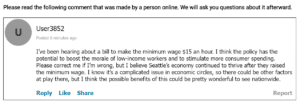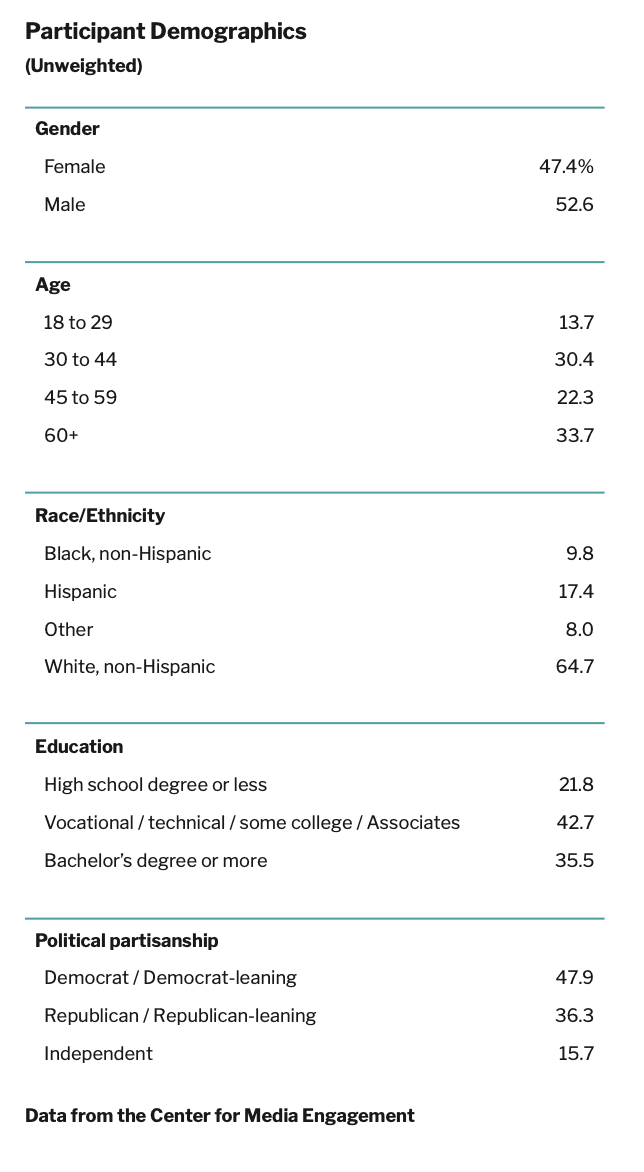
SUMMARY
Strong divisions in American politics can make it difficult for people to talk to each other productively. This problem can arise in a range of settings — from the dinner table, to social media forums, to the halls of Congress. Some people even give up talking about politics when they are around those with whom they disagree. This lack of meaningful engagement could drive us further apart as we miss opportunities to build understanding, tolerance, and common ground.
In this project, the Center for Media Engagement tested a tool that makes digital conversations across divides easier: expressing humility when sharing a political opinion. Online posts written with humility don’t just advocate for a position — they also prioritize openness toward other perspectives and acknowledge the limitations of the writer’s view.
Participants in our study found commenters who expressed humility to be more likable and intelligent, even though they held opposing views. Participants were also more willing to discuss and work to address a political issue with these commenters. Democrats and Republicans alike appreciated the use of humility, making it a good strategy for those looking to encourage engagement across the aisle.
PROBLEM
Look at any social media post or news comment about politics and chances are good that you’ll find content that falls short of reasoned and respectful conversation.
As Facebook whistleblower Frances Haugen suggested, content that agitates generates greater engagement which, in turn, leads it to be promoted by social media algorithms.1 This means that toxic, defensive, and antagonistic content is prioritized — exactly the sort of content that could lead to polarization or opting out of politics altogether.
Just because this sort of content is the norm, however, doesn’t mean it has to be. This research, part of the Center for Media Engagement’s connective democracy initiative, funded by the John S. and James L. Knight Foundation, aimed to uncover strategies that people can use to communicate across divides.
The study evaluated whether making political points with humility can help people come together rather than drive them apart. In particular, we looked at whether adding humility to political posts affects what people think of the posts and the poster.
KEY FINDINGS
Our research showed that posts written with humility improved impressions of the poster for both Democrats and Republicans. People who wrote posts with humility were seen as more likeable and intelligent by those holding a different political viewpoint. These posts also elicited fewer counter-arguments, or skepticism toward the argument or poster, from those who don’t share the author’s perspective. People were more willing to engage with the authors of humility-filled posts by sharing an oppositional view or by expressing interest in working across divides to address the issue. These results are based on a representative probability sample of 860 adult Americans.
IMPLICATIONS
Writing online posts with humility can help bridge divides among those with whom you disagree politically. Whether you’re an individual hoping to reach out to the other side or an organization dedicated to promoting understanding across the political aisle, humility can be a helpful strategy.
By humility, we mean language that acknowledges other perspectives, displays openness to differing opinions, and admits limitations to one’s own views. This can be expressed by using phrases such as “please correct me if I’m wrong” or “I know it’s a complicated issue, but…”
The findings can also be used by news organizations or social media companies interested in uplifting content that builds bridges. Journalists who engage with the public, or organizations that highlight top comments, may want to consider looking for comments that express humility.
FULL FINDINGS
The Center for Media Engagement asked participants to read a political post and share their thoughts. The posts varied in two ways. First, they covered one of four different topics:
- Increasing the minimum wage
- Providing Medicare for all Americans
- Cutting the corporate income tax rate
- Allowing people to sue social media companies for restricting free speech
We chose these topics because they are issues on which Democrats and Republicans hold different views:
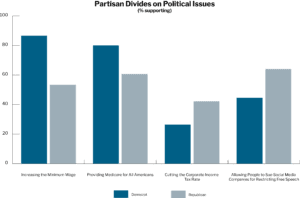
Second, the posts varied as to whether they contained more or less humility. What we mean by humility is:
- Displaying an openness to other perspectives
- Conveying a sincere interest in understanding other ideas
- Expressing possibilities, rather than certainties
- Admitting limitations2
For each issue, we created four different posts that varied based on whether they favored or opposed the policy and whether they were written with high or low levels of humility.
Example of Post with High Humility
As part of the study, people saw a post that disagreed with their initial view on one of the four post topics. So those who supported increasing the minimum wage saw a post from someone who opposed the increase and vice versa. After viewing the post, we asked people to tell us what they thought.
Although the political posters did not receive high ratings overall, humility made a difference. When people saw a post containing greater humility, they thought that the post author was more likable and more intelligent.3
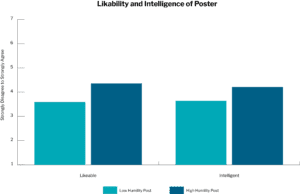
High humility posts also reduced counterargument, or skepticism toward the argument or poster, compared to low humility posts.4

People who saw the posts with high humility expressed greater interest in engaging with the person who wrote the post compared to those who saw the posts with low humility.5 They expressed a greater desire to have a conversation and work together to address the issue, even though they didn’t share the same view on the topic. The difference was more pronounced, and statistically significant, for the issues of providing Medicare for all Americans and cutting the corporate income tax rate.6

Importantly, these differences persisted regardless of whether people identified as Democrats or Republicans.7
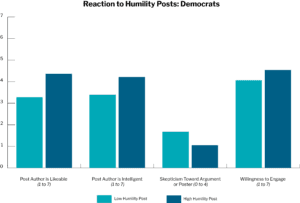
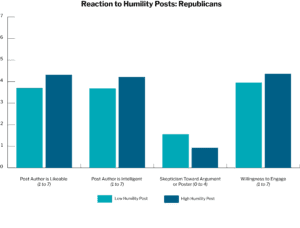
METHODOLOGY
This study was conducted with 1,047 American adults. Of the participants, 860 were randomly assigned to see a post and another 187 were randomly assigned to a control group that did not see a post and are not discussed here. Study participants were part of NORC at the University of Chicago’s probability-based panel AmeriSpeak. The AmeriSpeak panel is designed to be representative of the U.S. household population. Randomly selected U.S. households are sampled using area probability and address-based sampling, with a known, non-zero probability of selection from the NORC National Sample Frame. These sampled households are then contacted by U.S. mail, telephone, and field interviewers (face-to-face). The panel provides sample coverage of approximately 97% of the U.S. household population.
For this study, the response rate, including every stage from recruitment into the AmeriSpeak panel to the completion of the survey, was 3.7%. The full sample has a margin of error of +/- 4 percentage points. The study was fielded in both English and Spanish in the summer of 2021. All data in the report are weighted based on age, gender, census division, race/ethnicity, and education.
The study was a randomized experiment where people viewed a counter-attitudinal post that varied in two ways: the issue that was covered (Medicare, minimum wage, corporate tax, or social media) and the level of humility contained in the post (high or low humility). The study also included a control group where people did not see a social media post. Prior to conducting the study, the stimuli were pre-tested to ensure that they conveyed high (vs. low) levels of humility and favored/opposed each issue.
Study Stimuli
Minimum Wage Post with High Humility: Opposed
I’ve been hearing about a bill to make the minimum wage $15 an hour. I’m unsure that this is the most effective way to reduce poverty and the potential for the cost of goods to increase seems like a legitimate concern. Please correct me if I’m wrong, but I believe housing prices in Seattle went up when they raised the minimum wage and this caused a spike in homelessness. I know it’s a complicated issue in economic circles, so there could be other factors at play there, but I think possible impacts like this could be pretty concerning to see nationwide.
Minimum Wage Post with Low Humility: Opposed
I’ve been hearing about a bill to make the minimum wage $15 an hour. We should be concerned about this increasing the cost of goods and doing nothing to reduce poverty. Housing prices in Seattle went up when they raised the minimum wage and this caused a spike in homelessness. Impacts like this would be pretty concerning to see nationwide.
Minimum Wage Post with High Humility: Pro
I’ve been hearing about a bill to make the minimum wage $15 an hour. I think the policy has the potential to boost the morale of low-income workers and to stimulate more consumer spending. Please correct me if I’m wrong, but I believe Seattle’s economy continued to thrive after they raised the minimum wage. I know it’s a complicated issue in economic circles, so there could be other factors at play there, but I think the possible benefits of this could be pretty wonderful to see nationwide.
Minimum Wage Post with Low Humility: Pro
I’ve been hearing about a bill to make the minimum wage $15 an hour. The policy would not only boost the morale of low-income workers, but also stimulate more consumer spending. Seattle’s economy continued to thrive after they raised the minimum wage. The benefits of this would be pretty wonderful to see nationwide.
Medicare Post with High Humility: Opposed
My understanding is that a program like Medicare For All could raise taxes for many Americans while lowering the quality of healthcare and medical workers’ wages. I acknowledge that our current system is not perfect by any stretch of the imagination, and I would want to address some of the concerns I’ve heard from people who want to see it reformed somehow. Working with the information I have though, Medicare For All doesn’t feel like the best way forward.
Medicare Post with Low Humility: Opposed
Medicare For All will raise taxes for everyone while lowering the quality of healthcare and medical workers’ wages. Our current system works perfectly in this country and all these concerns about it are completely baseless. Medicare For All is the worst way forward!
Medicare Post with High Humility: Pro
My understanding is that a program like Medicare For All could lower costs by cutting down on pricey ER bills and preventing pharmaceutical companies from setting inflated drug prices. I acknowledge that it’s not a perfect system by any stretch of the imagination and I would want to address some of the concerns I’ve heard from people who are skeptical of it. Working with the information I have though, Medicare For All feels like a good way forward.
Medicare Post with Low Humility: Pro
Medicare For All will lower the costs for everyone by cutting down on pricey ER bills and preventing pharmaceutical companies from setting inflated drug prices. This kind of system would work perfectly in this country and all these concerns about it are completely baseless. Medicare For All is the only way forward!
Corporate Tax Post with High Humility: Opposed
There are aspects about the plan to pass corporate tax cuts that I don’t support. From what I’ve read, they don’t seem to foster economic growth in many circumstances. In theory, low corporate taxes could increase our national debt and hinder our ability to invest in other important issues, like infrastructure. I know not everyone thinks this way though, so I’m open to learning about any other points that economists at least somewhat agree on.
Corporate Tax Post with Low Humility: Opposed
I entirely oppose the plan to pass corporate tax cuts. They don’t foster economic growth in any circumstances. Low corporate taxes would increase our national debt and hinder our ability to invest in more important issues, like infrastructure. Economists agree with me!
Corporate Tax Post with High Humility: Pro
There are some aspects about the plan to pass corporate tax cuts that I support. From what I’ve read, they seem to foster economic growth in many circumstances. In theory, companies could create more local jobs and wages for most workers could rise. I know not everyone thinks this way though, so I’m open to learning about any other points that economists at least somewhat agree on.
Corporate Tax Post with Low Humility: Pro
I entirely support the plan to pass corporate tax cuts. They foster economic growth across the board. Companies would create more local jobs and wages for all American workers would rise. Economists agree with me!
Social Media Post with High Humility: Opposed
This may just be me, but I worry that social media companies sometimes aren’t removing enough offensive content from their platforms. It’s my understanding that as private companies, they have the right to remove content in some cases. One idea could be to remove the accounts of groups consistently posting harmful or misleading content. I think social media companies should be able to try to create safer spaces without worrying about lawsuits. However, I recognize there may be downsides to this as well. Open to others’ ideas!
Social Media Post with Low Humility: Opposed
Social media companies aren’t removing enough offensive content from their platforms. As private companies, they have every right to remove content. They should start by removing all accounts that post harmful or misleading content. Social media companies need to be able to create safe spaces without worrying about lawsuits. There are absolutely no downsides to this!
Social Media Post with High Humility: Pro
This may just be me, but I worry that social media companies are sometimes being heavy-handed when removing content from their platforms. I acknowledge that some posts may be offensive or misleading, but in a democracy, I think it’s important that we prioritize the free exchange of ideas online. One idea may be to create a legal path for people to appeal the removal of their posts and hold platforms accountable if they are restricting free speech. However, I recognize there may be downsides to this as well. Open to others’ ideas!
Social Media Post with Low Humility: Pro
Social media companies are being heavy-handed in removing content from their platforms. In a democracy, we must prioritize the free exchange of ideas online no matter what, even offensive or misleading posts. We have to create a legal path for people to appeal the removal of their posts and hold platforms accountable for restricting free speech. There are no downsides to this!
SUGGESTED CITATION:
Murray, C., Duchovnay, M., and Stroud, N. J. (December, 2021). Making your political point online without driving people away. Center for Media Engagement. https://mediaengagement.org/research/political-posts-with-humility
- Zubrow, K. (2021, October 4). Facebook whistleblower says company incentivizes ‘angry, polarizing, divisive content.’ CBS News. https://www.cbsnews.com/news/facebook-whistleblower-frances-haugen-60-minutes-polarizing-divisive-content/ [↩]
- Leary, M. R., Diebels, K. J., Davisson, E. K., Jongman-Sereno, K. P., Isherwood, J. C., Raimi, K. T., … & Hoyle, R. H. (2017). Cognitive and interpersonal features of intellectual humility. Personality and Social Psychology Bulletin, 43(6), 793-813; Haggard, M., Rowatt, W. C., Leman, J. C., Meagher, B., Moore, C., Fergus, T., … & Howard-Snyder, D. (2018). Finding middle ground between intellectual arrogance and intellectual servility: Development and assessment of the limitations-owning intellectual humility scale. Personality and Individual Differences, 124, 184- 193; McElroy-Heltzel, S. E., Davis, D. E., DeBlaere, C., Worthington Jr, E. L., & Hook, J. N. (2019). Embarrassment of riches in the measurement of humility: A critical review of 22 measures. The Journal of Positive Psychology, 14(3), 393-404; Van Tongeren, D. R., Davis, D. E., Hook, J. N., & Witvliet, C. V. (2019). Humility. Current Directions in Psychological Science, 28(5), 463-468. [↩]
- Likable was measured using six items asking people to indicate how much they agreed/disagreed that the person who wrote the comment was trustworthy, likable, friendly, warm, honest, and sincere. Responses were averaged (M = 3.98, SD = 1.26, Range = 1 to 7 with higher values indicating more likable, Cronbach’s alpha = .91, all items load on a single factor using a principal components analysis with varimax rotation where the first factor explains 68.89% of the variance). Intelligent was measured using five items asking people to indicate how much they agreed/disagreed that the person who wrote the comment was intelligent, skilled, competent, efficient, and capable. Responses were averaged (M = 3.93, SD = 1.26, Range = 1 to 7 with higher values indicating more intelligent, Cronbach’s alpha = .92, all items load on a single factor using a principal components analysis with varimax rotation where the first factor explains 75.50% of the variance). The difference between the high and low humility conditions is statistically significant for likable (F(1, 801) = 83.99, p < .001) and intelligent (F(1, 801) = 43.11, p < .001) using an ANOVA and controlling for the issue to which one was assigned. [↩]
- Counter-argument was measured by asking people to write what they were thinking about while reading the comment in up to five open-ended boxes. The responses were coded first for relevance, or whether the response was related to the comment. Relevant comments were then coded for disagreement, or whether the response reflected a negative evaluation of the comment’s content or source. Two coders evaluated 20% of the responses for reliability (Krippendorff’s alpha for irrelevance: 0.96 and disagreement: 0.78). The final measure ranged from 0 to 4 (we combined people who wrote 4 or 5 counter-arguments as only 2.4% of the sample wrote 5 counter-arguments). On average, people wrote 1.28 counter-arguments (SD = 1.23). The difference between the high and low humility conditions is statistically significant for the number of counter-arguments (F(1, 802) = 50.16, p < .001) using an ANOVA and controlling for the issue to which one was assigned. [↩]
- Willingness to engage was measured using three items asking people to indicate how willing/unwilling they would be to share their opinion with the person who wrote the comment, have a conversation with the person who wrote the comment, and work to address the issue with the person who wrote the comment. Responses were averaged (M = 4.24, SD = 1.55, Range = 1 to 7 with higher values indicating more willingness to engage, Cronbach’s alpha = .90, all items load on a single factor using a principal components analysis with varimax rotation where the first factor explains 84.05% of the variance). The difference between the high and low humility conditions is statistically significant for willingness to engage (F(1, 800) = 12.13, p < .001) using an ANOVA and controlling for the issue to which one was assigned. [↩]
- There was a significant interaction between the topic of the post that people saw and whether it contained more or less humility in predicting willingness to engage (F(3,797) = 3.10, p < .05). In particular, those seeing counter-attitudinal posts about Medicare for all Americans and the corporate income tax rate were significantly more willing to engage with the author of a post containing more humility than the author of a post containing less humility. The differences were not significant for those seeing counter-attitudinal posts about the minimum wage or free speech on social media, although the means were in the expected direction. [↩]
- In an ANOVA with humility condition, issue condition, party, and an interaction between party and condition, we examined the differences between the low and high humility conditions for Democrats and Republicans. In all instances, the differences were statistically significant and in the same direction. [↩]





